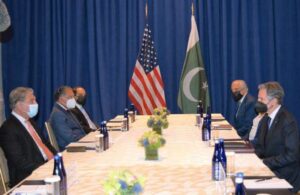It is believed that the relations between any two countries are dependent on the behaviour of the two with each other. But in realpolitik the impact of the behaviour is directly proportional to the power being wielded by each side. There are no such things as ethics, justice, a level playing field or fair play. It is a simple, and at times complicated, interplay of competing or aligned interests. Thus for a weak country (void of resources and political will) to stand up for its legitimate interests (political, economic and way of life) is a Herculean, and nearly impossible task.
How then should we categorise US-Pakistan relations? On one side is a Super Power with an injured ego and on the other end barely a mid power country, struggling for internal political and social harmony, facing tense relations with all its neighbours, with an economy totally hostage to the IMF, and World Bank, ineffective governance and a highly flawed decision making mechanism. All the game-changing opportunities (CPEC, Afghanistan) are being flouted by an inept system that seems to be designed just to create impediments for all positive steps and nurture all that is evil.
The situation within the USA is troubled as well. An internal political stand off, a series of failed military campaigns, apprehensions of a rising China and resurgent Russia, shrinking political clout, coupled with chinks in the economic armour, have all combined to profoundly impact clear vision and ability to take right and timely decisions. They are not ready to listen to the sane voices emerging from within their polity, society or elsewhere. So relations with the rest of the world are likely to get affected by these factors, along with some specific regional developments that could aggravate the situation.

We will not review the entire history of Pak-US relations; rather we shall take stock of the situation as it stands now. The American establishment is looking for a scapegoat to cover up its own political and military incompetence, whereby it totally missed out on the history and sociology of this region in general and that of Afghanistan in particular. Enduring US interests in the region like resisting Chinese political and economic influence and preventing Russian access to the Indian Ocean will keep them glued to the Afghan situation and thus to Pakistan. The well-tested tools of carrot and stick are being employed once again for the umpteenth time. Hopefully we will not opt for appeasement again, succumbing to their indirect and direct pressures, our critically curtailed freedom to make independent policy decisions notwithstanding. Similar techniques are being employed against the fiercely independent Afghans, with Iran already playing a defiant role. India, on the other hand, is joining ranks with the US to further her own motives related to Pakistan and China.
With a botched up economy, effectively cornered by the clout of IMF and FATF etc, Pakistan has limited conventional options, strengthening the mortal grip of the US and institutions under her strong influence. An out of the box solution is required to emancipate Pakistan from this dreadful debt trap. Irrespective of its precarious economic situation and internal disharmony and resulting weak policy framework, Pakistan cannot compromise on some basic vital national interests: its relationship with China, peace in Afghanistan, CPEC, Kashmir etc. And in all these areas, Indian and US interests closely match, and run squarely across Pakistan’s objectives.

So how should Pakistan find converging interests with the US in its own region? Firstly if the US desires that CPEC should remain only an economic corridor and not be converted into a strategic corridor, Gwadar as a foreign military base etc. they need to talk to Pakistan. Maybe this is one area where we can hope to converge. After all, with a large coastal region, we can offer economic incentives to more than a single entity. Secondly, America would definitely not like to leave Afghanistan totally under the influence of China, Russia and others. Though evacuating militarily, they would like to return with a new strategy, and compete in the fields of economy and politics. Operating (not in the military sense) from the safe base of Pakistan is the best bet even today. Here also, Pakistan after developing an understanding with China and Afghanistan, and putting forth some matching demands, can create a conducive converging environment.
Now it is up to the US, Western Allies and India to decide on adopting one of the two broad options. One, to keep following an adversarial relationship with the new Interim Afghan Government and keep trying to precipitate turmoil and unrest by employing legal, economic, political and covert intelligence instruments ( the policy being presently followed). Two, to change strategy, take a wide U turn and come back with investment, loans, aid etc, mainly through INGOs and third party corporate companies initially, and later directly. This may result in enhanced politico-economic leverage for the US, West and India. And it could be a good match for Sino-Russian ingress in the Region.
It is assessed that America and her Allies will be much better off if they go for the second option of rapprochement and keep competing with China and Russia, rather than totally leaving the field open for them. But for that to happen smoothly, a patch up with Pakistan will be required once again. And Pakistan’s Prime Minister has reiterated a number of times that we can join in the efforts for peace and economic activities. And to enable this option to succeed, Pakistan will have to be provided some respite from the financial stranglehold, and the resistance to CPEC will have to be dropped. The wild card in this entire scenario is India, with her enduring designs against Pakistan, and animosity with China. America will have to tame this ally.
To conclude, all is not lost in Pak-US relations. It is for the leadership of both countries to realise the potential that can bring the countries closer. Pakistan still enjoys some leverage:(geographical location, relations with China and Afghan regime etc) and the US can play with its political, economic and media clout. The only baseline being, that this time, Pakistan must not sell itself cheap, and ensure cutting itself free from the ominous debt trap and Indian bullying. But the US leadership will take the final decision, if it can view what has been proposed positively. The future relationship is also dependent heavily on the ability of the Pakistani Foreign Office to work with conviction, knowledge and IR logic, laying out the plans of cooperation and mutual assistance clearly and convincingly, assuming an active role rather than waiting for any signs of a first move from the other side.



